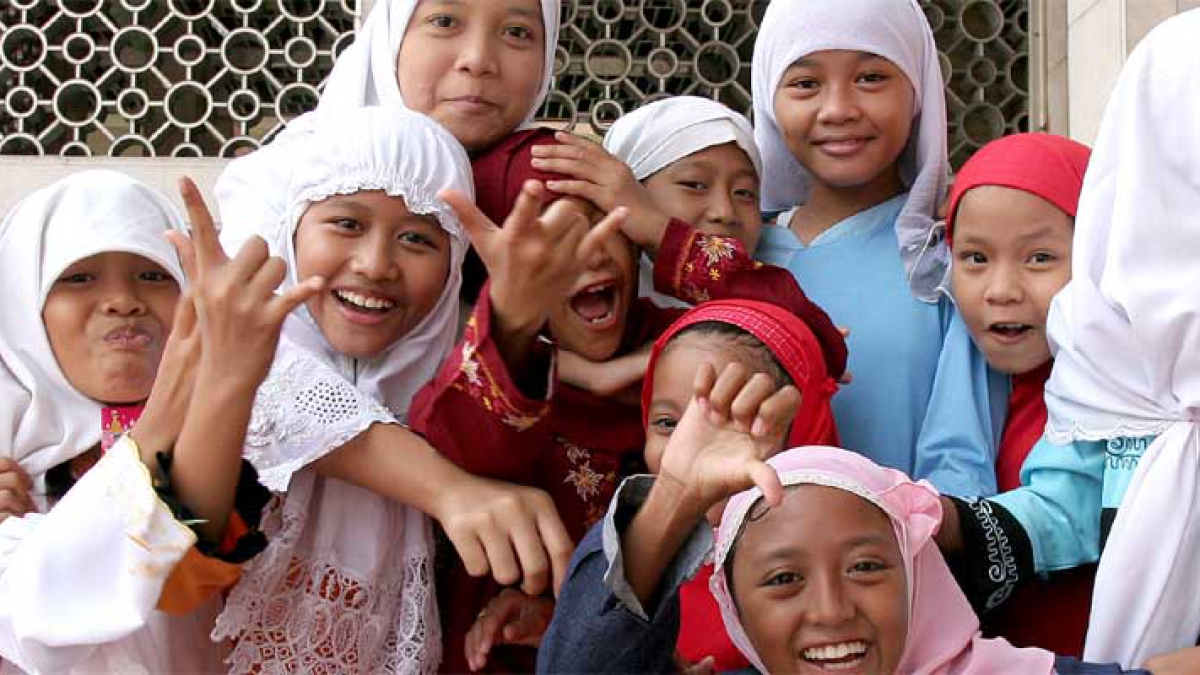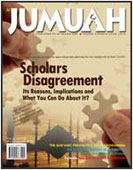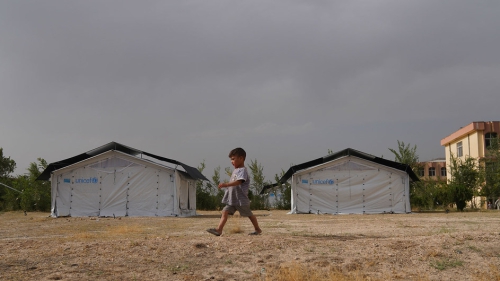A Fiqh Perspective on Raising Children

I. Tarbiyyah
It's Meaning in the Arabic Language and in the Terminology of the Fuqahaa'
A. Tarbiyyah in the Arabic language means to raise a child (whether or not that child is their own), acting in his or her best interest until that child becomes independent and capable of managing its own affairs. Tarbiyyah includes following up the child's nutrition, his or her physical, spiritual, and mental growth, and his or her education and acquisition of manners in such a way that the child is well taken care of, well-nourished, and well-mannered. The fruit of this labor is that when a child grows up to be a man or woman, they are equipped to handle the burdens of life, and they have the tools they need to have a successful Afterlife.
B. Tarbiyyah from a fiqh point of view is synonymous with the linguistic meaning, except that it is a little more specific. Fiqh is mainly concerned with the following three aspects of raising children:
C. Educating them in a well-rounded way about what they need to know in terms of religious sciences, such as fiqh, and worldly knowledge, such as arithmetic.
D. Training them in Islamic behavior and values, for example in telling the truth, in good manners, such as respecting elders, and in refined etiquette as in eating in a calm manner.
E. Building and strengthening their Islamic identity such that they think of themselves as Muslims before they think of themselves as the sons or daughters of so-and-so, eastern or western, etc.
II. Educating the Children
A. There is ample evidence from the Qur'an that educating children is necessary: Allah, Glorious and High, said: O you who believe! Save yourselves and your families from a Fire whose fuel is people and stones...[66:6].
Al-Qurtubi said in his tafseer of this verse:
"Some of the scholars have said that when Allah, Exalted and High, said: 'Protect yourselves!' that it included protecting one's own children from the Fire of Hell because one's children are a part one's own self. Al-Qushayri reported that when this verse was revealed Umar ibn al-Khattaab said to the Prophet Muhammad, sallallahu alayhe wa sallam: "We can protect ourselves from the Fire of Hell, but how can we protect our families? "The Prophet, sallallahu alayhe wa sallam, said: "By forbidding them from what Allah forbade and commanding them with what He commanded." So because of this some scholars have said: "We must teach our children religion and goodness in addition to what good manners should necessarily be known."
B. Evidence from the Sunnah that a man is responsible for the education of his family:
Bukhari reported that the Prophet, sallallahu alayhe wa sallam, said:
"There are three (kinds of) people who will be rewarded twice (double): (The first is) a man from the People of the Book who believed in his prophet and then believed in Muhammad (sallallahu alayhe wa sallam). (The second is) a slave that fulfilled his obligation to Allah and his obligation to his master. (The third is) a man that had a slave girl whom he taught good manners and taught them to her well, and whom he educated and educated her well, then set her free and married her. Thus shall he receive his reward twice (double)." Bukhari titled this hadeeth, A man educating his slave-girl and his family. Ibn Hajar explained why Bukhari considered this hadeeth as proof that a man is responsible for the education of his wife even thought the wife is not explicitly mentioned in the hadeeth. Ibn Hajar said: "The responsibility of a man toward his family [meaning explicitly wife and children) is greater than that toward his slave girl. "Therefore, this hadeeth is indirect proof that a man is responsible for the education of his wife and children.
III. Teaching Children Manners
A. HERE ARE A TWO HADEETH ABOUT TEACHING BOYS GOOD MANNERS:
Tirmithi reported that the Prophet, sallallahu alayhe wa sallam, said: "A father has never given to a son a gift better than good manners." Ibn Majah reported that the Prophet, sallallahu alayhe wa sallam, said: "Be gracious with your children and teach them good manners."
B. A HADEETH ABOUT TEACHING GIRLS GOOD MANNERS:
Abu Dawud reported that the Prophet, sallallahu alayhe wa sallam, said: "[A man] who raises three girls, and teaches them good manners, and marries them [to righteous men], and is good to them-for him is Paradise."
C. THE TIME TO BEGIN TEACHING CHILDREN MANNERS:
Training children begins when they are very small. It should, however, start out very slowly. As the child becomes more and more capable of reason, the training should become more and more intensive. From the time the child is very young until he or she reaches seven years of age there should be an abundance of love and gentleness. From seven to 10, the training should be come gradually more intense, but there should also be an abundance of patience and very little or no punishment. The most important and intensive period when it comes to training children is from age 10 to 14. Then the parent should be fully engaged in the training the child in good manners, and there should be reasonable punishment for bad behavior. The Prophet, sallallahu alayhe wa sallam, said: "Command your children to pray salah when they are seven. Hit them about it (meaning if they willfully do not pray) when they are ten and separate (at that age) between them in bed."
IV. Establishing the Muslim Identity of the Child
A. WHAT DO WE MEAN BY MUSLIM IDENTITY?
Having a Muslim identity means the child is a Muslim in terms of his other thinking, speech, actions, behavior, ways, goals, purpose in life, perspective on affairs, how one judges matters, how one interacts with others, how one strives to spread Islam and establish truth and extinguish falsehood, and how one holds strongly to Islamic principles, even if others abandon them. In short, what we mean by Muslim identity is that a person strives to be upright in and of him or herself, and strives to help others be upright.
B. THE ADVICE OF LUQMAN TO HIS SON
The Quran gives an example of a father admonishing his son for all fathers to follow. Luqman's admonitions to his son consist of three main points that revolve around establishing one's Muslim identity.
- He teaches his son the Oneness of Allah (31:13-16) and teaching him about Allah and His attributes-namely that He has unlimited knowledge
- He teaches his son to be righteous, in and of himself, and to command others to be righteous. Luqman does so by commanding him to pray salah (31:17), enjoin others to goodness, to forbid them from evil, and to be patient with the afflictions Allah tests people with
- He teaches his son to stay away from boasting and arrogance
C. THE PROPHET'S ADVICE TO IBN ABBAS
Tirmithi reported that Ibn Abbas said: "I was behind the Prophet, sallallahu alayhe wa sallam, one day [riding], and he said: 'Young man! Let me teach you some words [of wisdom]. Observe the boundaries of Allah, and Allah will protect you. Observe the boundaries of Allah, and you will find Allah near. And if you ask, ask Allah. And if you seek support, seek support from Allah. And know that the entire Ummah, if it gathers together to benefit you with something, they will not be able to benefit you with something, except for a thing that Allah has written for you. And if they gather together to harm you, they will not be able to harm you with something, except with something that Allah has written against you. The pens have been lifted and the scrolls are dry."
Every parent should teach their child what Luqman taught his son and what the Prophet, sallallahu alayhe wa sallam, taught Ibn 'Abbas. All of what the Prophet, sallallahu alayhe wa sallam, taught Ibn Abbas in this hadeeth revolves around a principle that the child should recognize: Everything is in the hands of Allah. So they should turn to Him. Nothing is in the hands of people. So they should not seek to please people. This is the core value we should seek to instill in our children.
*****
Article provided by Al Jumuah Magazine, a monthly Muslim lifestyle publication, which addresses the religious concerns of Muslim families across the world.
To subscribe please visit https://www.aljumuah.com/subscription
Topics: Adab (Islamic Ethics), Children, Islamic Jurisprudence (Fiqh) Values: Education, Manners
Views: 13620
Related Suggestions


















